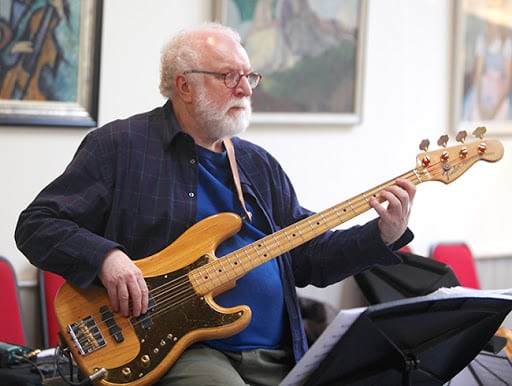
Q: How, if at all, might a ‘latent’ bassist benefit from being an accomplished guitarist first and foremost?
I don’t know what a latent bassist is. If you are a bass player I think it’s important to have a knowledge of other instruments — guitar, keyboards, drums — so that you understand how they all fit together, and so that you can explain an idea to another player clearly.
Bass has certain special properties: it helps to define the rhythm or style of a piece, it acts as a kind of route map for the other players, and it dictates the emotion of the chord above it. It took me years to figure that out.
Q: Thanks. I ask only because despite the passage of time, I still admire Keith Richards bass playing on Sympathy For The Devil and Pete Townshend (using the alias "Bijou Drains") played bass guitar on the Thunderclap Newman album and all their singles,
Okay
Q: Thinking of Pete T, I wonder to what extent Mo you are interested in and/or influenced by classical music? I ask because in 2009 he was interviewed by the BBC revealing the influence on his songwriting of Baroque composer Henry Purcell. Moreover, he played examples of how, why and when this took place. (note for readers, this can be found at https://www.bbc.co.uk/programmes/b00nf3kr )
A I started out in classical music — it’s all there was — playing recorder and violin. Interest in the guitar had yet to happen (yes I’m that old). I’ve since done a lot of listening. Bach single-handedly wrote the rules for basslines.
But for beautiful harmonic ideas I listen to later composers such as Ravel, Delius, and Copeland.
Q: As an assessor for JAMES, (readers, this is an industry organisation that gives accreditation to music colleges throughout the UK) what are the standout experiences?
It was exciting to find lecturers who were passionate about their subject. Conversely it was depressing to meet lecturers who had not heard of PRS, MCPS, and PPL.
Q: The Baskervilles. What was it like, supporting The Who?
Sorry, I have no memory of the evening. But I do remember that we borrowed a plectrum from Paul Simon — and never gave it back.
Q: Affinity. Despite a strong reception from the press and broadcasters, commercially it failed. With the wisdom of hindsight, 50 years on, why was this?
A: When a relationship breaks down within a band everyone is affected. Only with bands like Fleetwood Mac — where there is a lot of money at stake — can they carry on.
Q: Nelkon and Parker. Does that ring a bell?
A: Should it?
Sort of. A bit of nostalgia. We both studied A-Level Physics and most schools chose this book as the foundation to the course. It’s still in print.
Q: Being a sideman, and looking at the many you have supported over the years, I guess that from an early age you learned both the necessity and skill of diplomacy. Am I right?
A: Very much so. Shut up and think of the invoice.
H Wonderful, it truly is!
Q: I know from your Melody Maker advert, back in 1970 if I recall, that you admired the music of the band Family. So did I. I was fortunate to see them live in Manchester (I was studying at UMIST) and even now over half a century onwards they remain one of the finest musical acts I have ever seen. Their bassist came to a sad end. Was he much of an influence on your style, then and now?
A: Sorry, I don’t know about that. Which bassist? I’m still pals with drummer Rob Townsend.
H. Ah Ric Grech is the man in question. As in Family, Grech lasted two albums with Traffic — the live Welcome to the Canteen and the well-received The Low Spark of High Heeled Boys. Along with drummer Jim Gordon, Grech co-wrote the minor hit "Rock N Roll Stew."
Drugs, however, remained a problem, and Winwood and his bandmates eventually decided they had no alternative but to dismiss him.
Grech retired from music in 1977 and moved back to Leicester, where he reportedly became a carpet salesman. In 1990 he died of liver failure at the age of 44, as a result of alcohol addiction.
Epilogue
I was thinking about a cogent summary re this latest release. Anything I wrote was subordinate to this summary by David Randall and so I gave up He opined … . “This is a great album to allay any misconceptions about jazz. Beautifully played and produced, an album to be savoured in half light and with a good Bourbon.” He’s not wrong!
H. Thank you.
END






